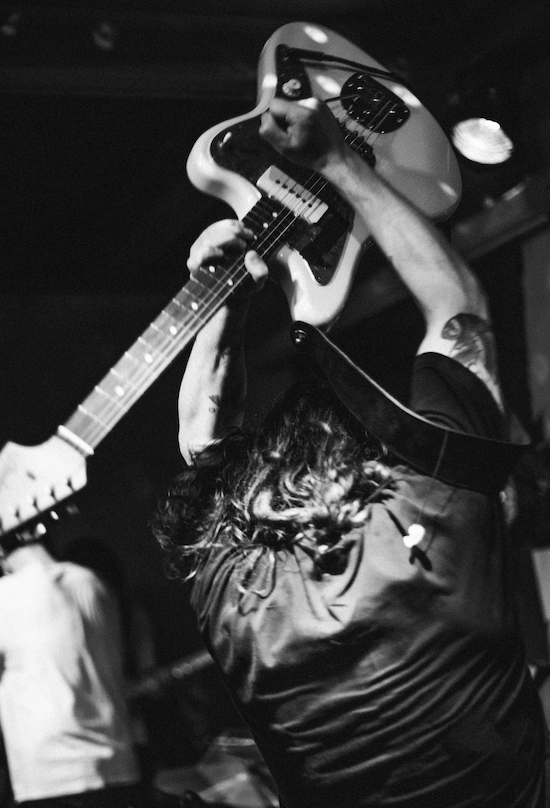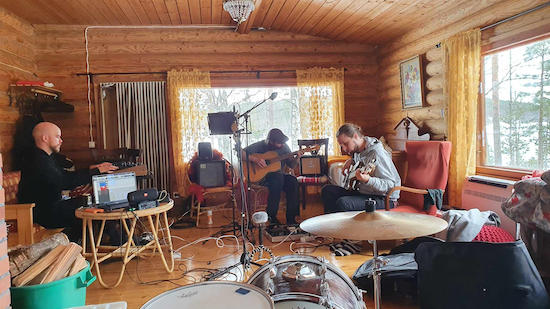tQ’s sixth favourite album in our 2023 chart was Valosaasteen Sekaan, by the enigmatic Finnish collective Musta Huone (which translates to Black Room). Propulsive and intense, it eschews stereotypes about their home country, the outside world’s fixation on cold weather, melancholia and specific genres like metal. The weather is particularly hard to ignore when tQ meets the band in Helsinki, where the temperature has dropped to minus 26 degrees Celsius. “It’s an anomaly for Southern Finland,” Pietu Arvola and Ville-Matti Koskiniemi reassure us.
Valosaasteen Sekaan came out a week before the UK premiere of Fallen Leaves, a film by the country’s renowned auteur Aki Kaurismäki, whose works often provide insight into the national psyche, albeit with room for exaggeration. Most of his characters are troubled working class heroes, looking for miraculous escape from their lives and sometimes their country (often to neighbouring Estonia). His latest offering, Arvola says, “is kind of like the best of Kaurismäki, it takes all the shticks from his previous films but it’s kinda nice”. Similarly to the recurrent mythological tropes within his films, the albums of Musta Huone balance a strong sense of identity and the search for an alternative path.
Although the members hail from Finland’s illustrious winter resort Rovaniemi, it was Helsinki’s creative hub Kallio where they met properly and formed the band. As well as guitarist and vocalist Koskiniemi and synths/noise man Arvola, the band consists of brothers Santeri and Joonas Passiala (bass and drums, respectively). Each of them came to this point via a unique path. Koskiniemi is a sound designer producing material for feature films and documentaries such as short films Blush – An Extraordinary Voyage and Yötyön Zen (They Go Gentle into That Night Work), while Arvola works as a video artist and electronic music producer. His solo project Bereen Ondo combines otherworldly ambient and anthropomorphic visual elements. Brothers Santeri and Joonas Paasiala developed a particularly eclectic music taste, a passion for Francophone chanteurs like Serge Gainsbourg and Jacques Brel alongside leanings towards psychedelic rock. “Our interests come from very different territories. I’m more of an experimental electronic person,” says Arvola. Adds Koskiniemi, “I’m more of a rock person. While working on this album, I was listening to a lot of bands like Sex Swing, Metz and so on”.
In keeping with the album’s sonic complexity, Koskiniemi’s lyrics are described as “introspective”. Arvola, whose peer review comes across as unbiased, says: “Somehow it amplifies what is inside the head of the storyteller.” This more personal approach is a direct contrast to their previous LP Hälve/Huove, where the personal is only ever alluded to, coated in references that hint more at a collective unconscious. “His lyrics are weirdly timed,” Arvola continues. “‘Maailmanloppu’, the second track on Hälve/Huove translates as The End Of The World and is about an apocalypse that doesn’t come the expected way.” Koskiniemi elaborates: “It was written a few months before the pandemic started, and is about staying inside one’s apartment and hearing the sounds from outside the house.” The propulsive 14-minute closer ‘Aistit’ was inspired by his passing the amphetamine dealers near Sörnainen station on his daily commute. “When we made this song, we realised this was the direction we wanted to go”, says Arvola. Koskiniemi sheds light on the lyrics. “The protagonist is a storyteller, he is on drugs but is carefully watching, observing weird things happening around him”. The scenery is perfectly delivered through the arrangement, a recurrent mildly distorted guitar riff atop relentless drumming that summons both the monochrome palette of Sigur Rós’s The Bracket Album and the raw intensity of The Stooges and Suicide.

Musta Huone perform live. Photo by Mathias Foster
The poetic title of Valosaasteen Sekaan translates as Among The Light Pollution, and the album’s strength comes from that contrast between dark and light. The band says that the concept is loose. “Light coming from different sources,” says Arvola. “I think for us, while doing the album, recording and writing the material, we were struggling to do things differently and avoid the melancholy.” When following up their last record, more important than strict conceptual framework was a desire to subvert stereotypes about supposed Nordic cool. “I’m trying to create something raw and aggressive, still beautiful and a bit melancholic but coming from a positive angle,” Koskiniemi says.
While Hälve/Huove, with its monochrome artwork and its ebb-flow maelstrom of noise and post rock, feels more straightforward, Valosaasteen Sekaan explores artier territory. The album begins with a distorted fragment of 1960s mall muzak that abruptly gives a way to stabbing rhythm guitar with a bouncy Pere Ubu feel. Such eclecticism partly resulted from the desire to shake things up during the slumber of the pandemic. “During the lockdown, we had a session in which we made a large pile of reel tape loops from random sounds that I combined for processing”, explains Arvola. “When we were working on the album, he again came across that particular piece which he thought sounded perfect for the opening”. Drummer Joonas Paasiala suggested the title ‘Peremmälle sisään’ which translates as ‘Step Further And Come Inside’.
“Certain parts of the album, you could call them accidents,” says Arvola. “For example, the ending part of the titular song is five minutes of Ville-Matti and our bass player Santeri playing with this Eko Tiger organ from the 1970s.” Koskiniemi recalls the process as somewhat epicurean. “We were drinking at the studio. Santeri started playing with the organ and I was in a control room listening to it. I then started pulling and closing the pipes, and the organ started acting weirdly. We had only one microphone in the ceiling. It was recorded accidentally through a PA system.” Eventually, the accidental recording was built up with additional synth and saxophone.
This borderline avant-garde approach is in juxtaposition to the straightforward nostalgia pervading much of their wider music scene. For instance, collectives like new wave duo Maustetytöt (which translates as Spice Girls) who combine grim post punk aesthetics and 90s pop ballads (they make a cameo appearance playing one of the songs in Kaurismäki’s Fallen Leaves). “We are anti-nostalgia, we are in the now”, confirms Arvola. Similarly, Musta Huone’s intensity seems to fight back against a seasonal, and often overwhelming, sense of loneliness. “Here in Finland,” Koskiniemi says, “when you have a long winter and it’s dark, you might end up spending a lot of time with yourself. Especially in Lapland. We are now in Southern Finland, but we are from Lapland, so it’s in our DNA. And it’s something you need to be aware of while writing music”.

Recording sessions for Valosaasteen Sekaan
Metal music is another cliché when it comes to their home country. “In our home town, Rovaniemi, we have Lordi Square [named after the heavy metal outfit that won the 2006 Eurovision Song Contest],” says Arvola. “The metal scene is still quite a prevailing thing, but not among people who are teens or in their 20s. It’s like a middle-aged thing, but I guess it’s a global phenomenon. The metal scene in Finland is something we have been consciously trying to avoid. For example, if we go to play gigs with other bands, we tend to favour having electronic, shoegaze or indie bands with us. We played with macho-type bands, and that didn’t resonate with us.”
Despite being distinctly escapist, Valosaasteen Sekaan seems to be in a dialogue with the contemporary psych-folk tradition of their motherland. Blurry field recordings and occasional lo-fi aesthetics hint at Paavoharju, venerable signings of Finnish label Fonal Records. Similar to the Savonlinna-based collective, Musta Huone embraces their origin while still being open to anything new. “Maybe that’s the reason why we are weird. [Rovaniemi] is a Christmas tourist city where British, Chinese and Russians come now and then. There is this weird façade, an artificial thing, and you are living in the middle of it.”
Musta Huone’s new album Valosaasteen Sekaan is out now via Paa Jotaki / This Is Not A Dog


